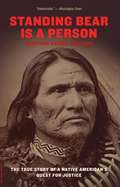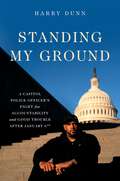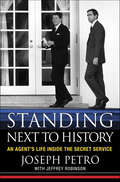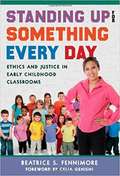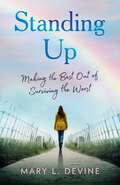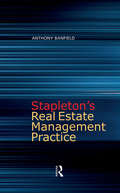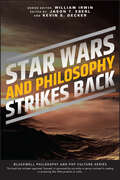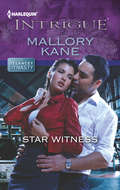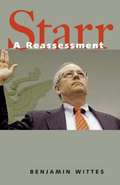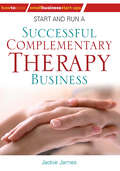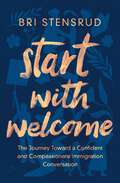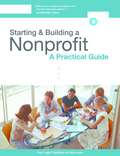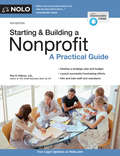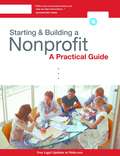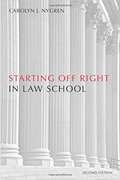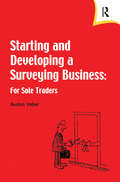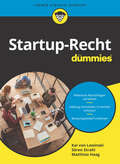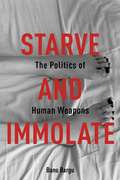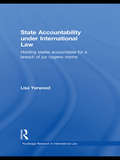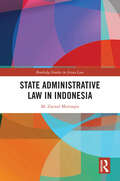- Table View
- List View
Standing Bear is a Person: The True Story of a Native American's Quest for Justice
by Stephen Dando-CollinsThe only book about the landmark trial of the first Native American to be recognized legally as a person-an eloquent reminder of a fight well fought. -"Kirkus"
Standing My Ground: A Capitol Police Officer's Fight for Accountability and Good Trouble After January 6th
by Harry DunnNew York Times Bestseller The stirring memoir of Harry Dunn, a Capitol Police Officer on duty January 6th, who has become one of the most prominent and essential voices regarding the truth of that day, and &“a must-read for those care about our nation&’s future&” (Congressman Eric Swalwell). Walking the halls of democracy as a Capitol Police officer, Harry Dunn was a man slowly experiencing an awakening. It sparked after the election of our first Black president. It grew as his belief in the bravery and honor of law enforcement was shaken by Ferguson and countless other cases of police brutality towards the Black community. It continued to burn brighter as he watched members of Congress, many of whom he had befriended, lose their way to partisanship, as political extremism intensified. And it exploded into a blaze when he fought side by side with his fellow officers on January 6th, when democracy and their lives were threatened.Standing My Ground is &“a powerful, patriotic tale – told with striking moral clarity&” (Congresswoman Nancy Pelosi) that provides a crucial, definitive firsthand account of what happened on that day our country was shocked to its core. But it will also share the story of a man who refused to stay quiet when he learned that some of the men and women he had risked his life protecting, who knew him by name, would deny the horrors they faced. That&’s when he chose to speak up and to seek out what his hero John Lewis once termed &“good trouble.&” Dunn&’s ongoing story as a witness willing to meaningfully engage with the media, lawmakers, and the public provides a backdrop for examining the political and racial divide in this country—one that we must overcome in order to demand accountability and preserve our precious democracy.
Standing Next to History: An Agent's Life Inside the Secret Service
by Jeffrey Robinson Joseph PetroA former Secret Service agent revisits his twenty-three-year career, including his time as Ronald Reagan’s bodyguard, in this “engaging” memoir (Publishers Weekly).Joseph Petro served for twenty-three years as a special agent in the United States Secret Service, eleven of them at the White House and four of those as the man on the shoulder of Ronald Reagan.From his days as an investigator in the field, to his time as the man on whom the life of the president depended, Petro’s journey through history is a singular look inside the most discreet law enforcement agency in the world; an unparalleled insight into Ronald and Nancy Reagan; plus an up-close-and-personal view of the late Pope John Paul II, whom Petro protected during his historic and extraordinary ten-day tour of the United States in 1987.The cast of characters in these never-before-told stories ranges from the Reagans and the Pope, to Frank Sinatra, Bob Hope, Mikhail Gorbachev, Fidel Castro, Margaret Thatcher, François Mitterrand, the Shah of Iran, George H. W. Bush, Dan and Marilyn Quayle, Henry Kissinger, Nelson Rockefeller, Gerald Ford, and would-be assassins.“A close-in view of how ‘the Great Communicator’ charmed critics and won loyal followers.” —The Christian Science Monitor“A fascinating portrait of Secret Service life.” —Library Journal
Standing Up for Something Every Day: Ethics and Justice In Early Childhood Classrooms (Early Childhood Education)
by Beatrice S. Fennimore Sharon RyanStanding Up for Something Every Day is written for present and future teachers in the early childhood classroom who truly want to make a difference in the lives of children. Exploring some of the most complex and pressing social and ethical dilemmas confronting early childhood educators, the author provides concrete ways of addressing social justice concerns in practice. Four model teacher-guides accompany readers from chapter to chapter, and demonstrate strategies for standing up for children through ethics, respect for diversity, and commitment to advocacy. This book offers important insights, encouragement, and practical suggestions to early childhood educators who are committed to excellence and equity in their classrooms.
Standing Up: Making the Best Out of Surviving the Worst
by Mary L. DevineFor true-crime fans, a gripping memoir of a domestic violence survivor who becomes a police detective in the domestic violence unit and is forced to face her demons when her first major case mirrors her own violent assault.Standing Up invites you on an exhilarating journey with a woman who refuses to be defined by her scars. A pulse-pounding chronicle of survival against all odds, this memoir takes readers along on a plunge into the chilling depths of abusive relationships. At the tender age of twenty-three, Mary Sweeney-Devine unwittingly stumbled into the clutches of her abuser, igniting anguish and despair. With each heart-wrenching trial, including a hospital visit, she unearthed a reservoir of resilience she didn&’t know she possessed. But just when she thought she had weathered the storm, a second marriage to a recovering alcoholic unleashed a tempest of secrets and unforeseen challenges. Yet Devine emerged from the darkness, fueled by an unyielding determination and a fierce spirit. With the help of unexpected allies, determination, and a sprinkling of humor, she navigated the treacherous terrain of her past—and reclaimed her life with courage. Offering hope to those ensnared in the vicious cycle of abuse, Standing Up is a riveting testament to Devine&’s indomitable spirit and a gripping saga that will leave you breathlessly rooting for the victory of the human heart over adversity.
Stapleton's Real Estate Management Practice
by Anthony BanfieldPreviously known as Estate Management Practice, the fourth edition of this work has been renamed to reflect current market practice and to embrace the discipline of corporate real estate. This book provides a comprehensive study of the management of urban property and is divided into three parts. Part one considers the diverse nature of the many types of estates and different aspects and interpretations of the management task. Part two concentrates on the management of leased property, repairs, service charges and rent reviews and the statutory framework within which the landlord and tenant relationship has developed. Part three is concerned with the positive management covering both technical skills, such as portfolio performance, and the professional practice environment in which they are exercised. Stapleton’s Real Estate Management Practice is written both for advanced students and practitioners. It provides a firm basis for management affecting the decision-making hierarchy from tenant to property, to portfolio, to proprietary unit. While retaining the format of previous editions, it has been updated to reflect the many changes in the law, practice, technology and the market place since the previous edition. In addition, this new edition highlights factors that influence the enhancement of different types of property and the various strategies involved in managing properties from both owners’ and occupiers’ point of view.
Star Wars and Philosophy Strikes Back: This Is the Way (The Blackwell Philosophy and Pop Culture Series)
by William IrwinShould droids be free? Should clone troopers? What political and ethical ideas ground resistance and rebellion? What’s wrong with the way women are portrayed in Star Wars? Does Han Solo have a philosophical worldview? Was Galen Erso responsible for the destruction of Alderaan? Should you eat Baby Yoda? “This is the Way.” In Star Wars and Philosophy Strikes Back, the Way wends through entirely new adventures in the Star Wars galaxy far, far away: not only the films of the Skywalker saga, but also Rebels, The Bad Batch, Rogue One, Solo, and The Mandalorian. Like the creators of these films and television series, the authors in this book harness the magical mix of humor, action, empathy, characterization, adventure, and fan service that constitutes Star Wars. In addition to thorny metaphysical questions about the nature of time and free will, this volume highlights the staggering cultural impact of George Lucas’s universe. The newest Star Wars narratives tackle ethnicity on alien worlds and how love and sex with a droid like L3-37 would work (“It works”). The connections between the Separatist Freedom Movement and the struggle for social justice in the USA in the 21st century are brought to light. And philosophical second looks at Rian Johnson’s The Last Jedi prove there is much more to this controversial entry in the Skywalker saga. Thirty-six philosophers, both sages and scoundrels among them, examine the full range of deep questions throughout the Star Wars chronology—from The Phantom Menace to The Rise of Skywalker and beyond. “They have spoken.”
Star Witness
by Mallory KaneStorm on the horizon Dani Canto has precious few people she can trust.As prosecutor Harte Delancey's star witness against her grandfather's murderer, she's become a prime target-and a courtroom pawn. Protective custody seems to be the only solution, but she's not expecting Harte Delancey to be her personal bodyguard.Passion on the rise Harte vows to protect Dani himself to ensure her safety and testimony. After all, winning the case will also settle an old family obligation. But earning her trust is key. Now with a raging storm threatening New Orleans and gunmen on their heels, Harte must break down the walls Dani has erected around herself. Once he does, not only does he find unexpected passion, but the certainty that the only safe haven is within each other's arms....
Starr: A Reassessment
by Benjamin WittesAn attempt at a balanced view of Ken Starr's contributions.
Start and Run a Successful Complementary Therapy Business
by Jackie JonesBeing a great therapist and being a good business person require different skills. This book will help you as a therapist - new, or experienced - to concentrate on the things you need to do to make your business a success and avoid making costly mistakes along the way. It will help you understand the business you are entering into, decide what products and therapies you will offer, and how to differentiate yourself from the competition so that new clients will choose you. You will also discover how to: * identify your potential clients and market your business to them * choose the best business model for you to use, work out your costs and set your prices* produce a business plan which you can use continually to review how your business has progressed * keep efficient records of payments and outgoings * use the internet to effectively market your services and make full use of free marketing * prioritise the tasks you need to complete in setting up your business. / This comprehensive and accessible book includes case studies and examples, plus exercises to help you follow the steps needed to start and run your business. With it you will build your business on solid foundations and go on to develop a thriving therapy practice.
Start with Welcome: The Journey toward a Confident and Compassionate Immigration Conversation
by Bri StensrudYou've seen the headlines. You've watched the TV footage. People around the world are in dire situations and on the move. Current estimates suggest over 100 million people are forcibly displaced from their homes and seeking refuge in other countries. It seems as if everyone wants to come to the U.S., and if we're honest, that gives many of us pause.As Christians we're supposed to love our neighbor as ourselves. But we can't stop wondering if we showed welcome to the world, would it change our culture? Would it make us less safe? Would it be a drain on our taxes and local communities? Whether we realize it or not, our fears have trumped our faith. We fear those who seek a new life in our midst.So does the Bible have anything to say about immigration? Or is it just a political issue? Is it a pro-life issue? Where does this all fit in my faith and worldview?You have questions. You have fears. But you also have compassion.So, let's start there.Let's have the conversation you've always wanted to have about immigration. Let's ask hard questions and detangle from the easy talking points that still leave us curious about our calling. Let's attach confidence to your compassion.Get ready to dive into the whole of scripture to better understand what God calls us to do concerning immigrants and refugees. It's a journey, and I'm here to take it with you.In Start with Welcome, Bri Stensrud reveals that something is stirring in the American Church. Something much bigger than platforms, politics, and pundits. Something that could literally change the world.It all starts with one word: Welcome.
Start-Up Städtischer Bauhof: Mit e-Services und agilen Strukturen auf dem Weg in die digitale, kommunale Zukunft (essentials)
by Claudia Schneider Birgit Schenk Stefan KrausIn diesem essential zeigen Claudia Schneider, Birgit Schenk und Stefan Kraus am Beispiel des Bauhofs der Stadtverwaltung Herrenberg praxisnah, wie sich Geschäftsprozesse, Organisationsstrukturen und Menschen gleichermaßen verändern müssen, damit wirkliche Innovation eine Chance hat. Neue e-Services sowie neue Formen der Zusammenarbeit und der Verantwortungsübernahme sorgen für die Steigerung der Leistungsfähigkeit der Organisation und die Erhöhung der Arbeitgeberattraktivität. Das Buch gibt wertvolle Hinweise für Entscheider, die sich auf den gleichen Weg machen wollen.
Starting & Building a Nonprofit
by Peri PakrooStart a nonprofit and keep it running with this practical guide Rescue a school library. Preserve an endangered species. Support the arts. Whatever it is you want to do to give back to your community, Starting & Building a Nonprofit provides the kick start you need. Filled with user-friendly information, practical advice and step-by-step instructions, this book is your guide through the process of getting a nonprofit up and running. Learn how to: -pick the perfect name for your organization -structure a nonprofit to achieve your goals -choose and obtain a federal tax-exempt status -create a mission statement -develop a strategic plan and initial budget -launch a successful fundraising plan -recruit and manage board members and volunteers -hire and train staff -obtain necessary insurance -market your organization -create a winning website -keep your nonprofit running Starting & Building a Nonprofit goes beyond paperwork -- it addresses the big picture, showing you how to create a solvent, efficient organization that will make a real difference. And the newly revised edition has an updated chapter on building a website for your nonprofit, and updated forms and checklists to help you stay organized. Are you a California resident? Check out How to Form a Nonprofit Corporation in California.
Starting & Building a Nonprofit: A Practical Guide
by Peri PakrooBuild a great nonprofit More people than ever are committing themselves to serving their communities and changing the world. Whether you’re aiming to protect the environment, support the arts, or help people in need, understanding how to set up a solid nonprofit organization is a great foundation for being as effective as you can be. With practical advice, legal information, tips, and step-by-step instructions, this essential guide will help you get your nonprofit up and running—and keep it going! It explains how to: develop a strategic plan and budget recruit and manage board members, volunteers, and staff market your organization to your target audience raise money including traditional methods and crowdfunding build a website, use social media strategically, and avoid copyright troubles adopt policies that are legally sound and much more Whether you are dreaming of starting a nonprofit or are already in the trenches, Starting & Building a Nonprofit will help your organization make a real difference in the world. The fully updated eighth edition includes the latest information on building audience and promoting your mission on social media.
Starting & Building a Nonprofit: A Practical Guide
by Peri Pakroo J.D.During hard economic times, nonprofits are more important than ever. Here, learn how to create and nurture a nonprofit that will serve your vital mission, whether supporting the arts, rescuing a school library, protecting the environment, or making a difference in another important way. With practical advice, legal information, tips and step-by-step instructions, this essential guide will help you get your nonprofit up and running—and keep it going! Starting & Building a Nonprofit explains how to: develop a strategic plan and budget recruit and manage board members, employees and volunteers market your organization to your target audience raise money online through crowdfunding and other sites build a website and use social media and networking sites adopt policies that are legally sound and much more. Whether you are dreaming of starting a nonprofit or are already in the trenches, Starting & Building a Nonprofit will help your organization make a real difference in the world.
Starting Off Right In Law School (Starting Off Right Ser.)
by Carolyn J. NygrenThe 2018 printing of Starting Off Right in Law School, Second Edition, contains a new chapter, "Organizing Your Reading." To access the bonus chapter online, click here. Law school is different. Incoming students, confronted with an entirely new vocabulary and unfamiliar with the discipline's unique and demanding educational methods, are often disoriented. This book is designed to give these students a head start, both by introducing them to the fundamentals of the legal process and by helping them acquire the study skills necessary for success. Starting Off Right in Law School introduces new law students to the practice and study of law by following a lawsuit from its inception through the appeals process, illustrating what lawyers actually do, how they prepare, how they interact with clients and in courtrooms, how a lawsuit proceeds, and how students can effectively read and analyze cases, outline, and apply what they have learned on the exams. Widely used in law schools, the first edition of Starting Off Right in Law School prepared new law students to excel in doctrinal courses. The second edition has been updated to prepare students both for the broader demands of doctrinal courses and for the more distinct reading and writing demands of legal writing courses. This book is the perfect tool for pre-law students to read on their own or for law school orientation required reading.
Starting Your Career as a Photo Stylist: A Comprehensive Guide to Photo Shoots, Marketing, Business, Fashion, Wardrobe, Off Figure, Product, Prop, Room Sets, and Food Styling (Starting Your Career)
by Susan Linnet CoxThis invaluable career manual explores the numerous directions a career in photo styling can take. Starting Your Career as a Photo Stylist prepares new and working stylists with in-depth information on food styling, fashion styling, and six other areas of specialization. Readers will also learn everything they need to know about practical aspects of the profession, including production, casting, location scouting, working with a photo crew, creating a portfolio, and marketing their work. Established stylists will benefit from tips on how to develop and sustain their freelance careers, and business forms will provide aspiring stylists with a head start on building their businesses. Interviews with working stylists offer insight into what it takes to thrive in their line of work. Written by a stylist with over twenty years of experience, Starting Your Career as a Photo Stylist is the ultimate guide to this little-known and exciting career!
Starting and Developing a Surveying Business
by Austen ImberStarting and Developing a Surveying Business shows how surveyors can develop their own successful small business. For surveyors thinking of taking this step, guidance is provided on the pros and cons which will help the right decision to be made, and the key factors which help see the business through its early stages. For surveyors already running their own small business, consideration is given to factors which will help profitability and growth potential.
Startup Erfinderhandbuch: Ideen entwickeln und schützen
by Thomas Heinz MeitingerEin Startup ist ein Unternehmen, das einen technischen Schwerpunkt hat. Der Gründer eines Startups wird sich daher zunächst mit der vorhandenen Technologie befassen und deren Eigenschaften und insbesondere Nachteile genau studieren. In einem nächsten Schritt wird er eine technische Aufgabe herausarbeiten, die die Nachteile der bestehenden Technologie überwindet. Der Gründer muss außerdem eine betriebswirtschaftliche Evaluierung durchführen, ob das Lösen dieser Aufgabe zu einem Produkt für einen ausreichend großen Markt führt. Danach beginnt der kreative Prozess der Schaffung einer Erfindung. Die gefundene technische Idee ist darauf zu prüfen, ob sie verwendet werden darf, da sie keine fremden Patente verletzt, und ob sie durch eigene Patente geschützt werden kann. Außerdem sollte sich der Gründer eines Startups über spezialisierte Ausführungsformen Gedanken machen, die für besondere Anwendungen geeignet sind. Diese Ausführungsformen können zusätzliche Märkte eröffnen und stellen eine Bereicherung einer eigenen Patentanmeldung dar. Eine schnelle Patenterteilung kann damit ermöglicht werden. Die Anmeldung einer Marke ist dem Startup-Gründer zu empfehlen. Das Buch erläutert jeden dieser Schritte im Detail. Die Schwerpunkte des Fachbuchs sind die Entwicklung einer technischen Idee anhand existierender Technologien und deren Schutz durch das Patent-, Marken- und Designrecht.
Startup guide: how to document the processes of your company in record time
by Victor FreireThe ultimate guide to document the processes of your organization in only 11 steps. The book describes a simple way to handle the very difficult task of documenting all the company processes. In just 11 steps, you can document the process of your company in less than 3 months
Startup-Recht für Dummies (Für Dummies)
by Kai von Lewinski Soren Strahl Matthias HaagHaben Sie auch manchmal grandiose Ideen, die sich bestimmt gut als Unternehmung eignen würden? Gute Ideen können der Grundstein eines zukünftigen erfolgreichen Unternehmens sein. Dieses Buch bietet gesetzliche Werkzeuge zur Durchsetzung rechtlicher Ansprüche, um kreative Ideen in einem Startup zu schützen und Geschäftsgeheimnisse abzusichern. Darunter fallen nicht nur Geschäftsgeheimnisse, sondern auch Namensrecht, Markenrecht und andere Schutzrechte, sowie Lizenzen und Patente. Neben gesetzlichen Grundlagen und Ansprüchen, zeigt dieses Buch die Grenzen des Rechtsschutzes auf.
Starve and Immolate: The Politics of Human Weapons (New Directions in Critical Theory #33)
by Banu BarguStarve and Immolate tells the story of leftist political prisoners in Turkey who waged a deadly struggle against the introduction of high security prisons by forging their lives into weapons. Weaving together contemporary and critical political theory with political ethnography, Banu Bargu analyzes the death fast struggle as an exemplary though not exceptional instance of self-destructive practices that are a consequence of, retort to, and refusal of the increasingly biopolitical forms of sovereign power deployed around the globe.Bargu chronicles the experiences, rituals, values, beliefs, ideological self-representations, and contentions of the protestors who fought cellular confinement against the background of the history of Turkish democracy and the treatment of dissent in a country where prisons have become sites of political confrontation. A critical response to Michel Foucault's Discipline and Punish, Starve and Immolate centers on new forms of struggle that arise from the asymmetric antagonism between the state and its contestants in the contemporary prison. Bargu ultimately positions the weaponization of life as a bleak, violent, and ambivalent form of insurgent politics that seeks to wrench the power of life and death away from the modern state on corporeal grounds and in increasingly theologized forms. Drawing attention to the existential commitment, sacrificial morality, and militant martyrdom that transforms these struggles into a complex amalgam of resistance, Bargu explores the global ramifications of human weapons' practices of resistance, their possibilities and limitations.
State Accountability for Environmental Damage in International Armed Conflict (Routledge Research in International Environmental Law)
by Aïda Tamer ChammasThe book comprehensively analyses whether a State may be held responsible for environmental damage resulting from its wrongful conduct in international armed conflict.Focusing on elements of State responsibility’s main elements, obligations, damage and standard of conduct, under the law of armed conflict and international environmental law, the book covers war and occupation and other relevant applicable laws. This extends to international water and human rights law. It presents techniques to resolve conflicts of norms from different law branches, when simultaneously applied, and incorporates latest legal developments and potential impact on the subject. Engaging with detailed analysis of legal rules, the book highlights weaknesses within the law alongside proposing new interpretations of outdated notions. Practical application of the rules is illustrated by two cases of damage to land, Mediterranean Sea and air pollution in the Israel-Hezbollah war in Lebanon (2006) and to the Occupied Palestinian Territory’s natural resources, mainly land, water and quarries. It concludes by examining mechanisms to enforce State responsibility.The book will be of interest to graduate law students, researchers and practitioners in the field of international law, the law of armed conflict international environmental and water law and human rights law.
State Accountability under International Law: Holding States Accountable for a Breach of Jus Cogens Norms (Routledge Research in International Law)
by Lisa YarwoodThis book considers the extent to which States are held accountable for breaches of jus cogens norms under international law. The concept of State accountability is distinguished from the doctrine of State responsibility and refers to an ad hoc practice in international relations that seeks to ensure States do not escape with impunity when they violate norms that are considered fundamental to the interests of the international community as a whole. State Accountability under International Law sets forth a definition of State accountability and establishes a threshold against which the existence, or not, of State accountability can be determined. Using a Foucauldian influenced interpretive methodology, this book adopts a novel construction of State accountability as having legal, political and even moral characteristics. It argues that the international community seeks to hold States accountable utilising a variety of traditional and non-traditional responses that cumulatively recognise that the institutions that comprise and legitimise the State were instrumental in the particular breach. Using case studies taken from State practice from throughout the twentieth century and covering a range of geographic contexts, the conclusion is that there is evidence that State accountability, as it is conceptualised here, is evolving into a legal principle. The book draws together the many academic theories relating to accountability that have arisen in various areas of international law including environmental law, human rights and trade law before going on to examine an emerging practice of State accountability. A variety of ad hoc attempts and informal mechanisms are assessed against the threshold of State accountability established, with emphasis being given to practical examples ranging from the accountability of Germany and Japan after World War Two to the current attempts to seek accountability from Russia for former crimes of the USSR.
State Administrative Law in Indonesia (Routledge Studies in Asian Law)
by M. Zaenul MuttaqinThis book examines Indonesian laws regulating state administration, in other words, the relationship between the Indonesian government and its citizens.This book uses public administration science to explain state administrative law. It covers the historical evolution of state administrative law in Indonesia, the political and legal acceptance of the Universal Declaration of Human Rights in Indonesia as well as the ratification of the 2020 Omnibus Law reforms. It evaluates both the benefits and drawbacks of establishing laws through the Omnibus Law model, and the challenges of its adoption by the Indonesian statutory system. The book also examines state administrative law in other Southeast Asian countries, to provide a more nuanced understanding of how human rights implementation occurs in the respective legal regimes.Covering the legal reforms and changes to state administrative law in Indonesia, this book will be of keen interest to scholars of state administrative law, public administration, and constitutional law.
